Blending Theory and Practice: Experiential Learning in Hospitality Curriculum
A Case Study of Student Projects for Industry Clients
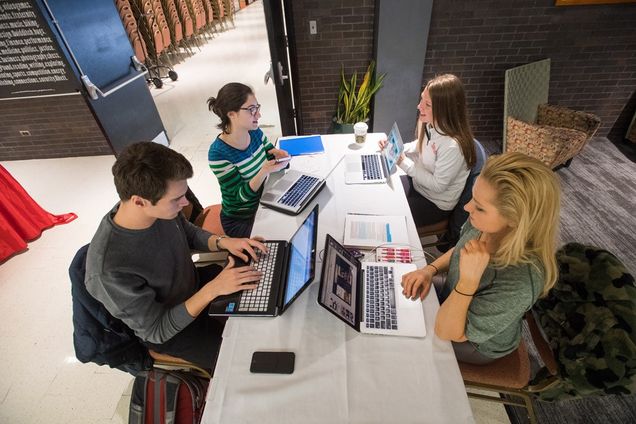
By Michael Oshins and Joel Brown
On the first day of Boston University’s School of Hospitality Administration’s (SHA) introductory hospitality course, Dr. Christopher Muller opens the class with the question, ”How do you teach hospitality?” In his 2016 BHR article on the topic, Muller offers an amalgamated model, including several learning concepts that addresses the “learning, knowing and doing” of hospitality industry education and curriculum. One educational approach that has proven to be successful in bridging the gap between theory and practice is experiential learning. Experiential learning expert, David A Kolb, provides historical context for the growth of this learning model in his 1984 seminal book, in which he highlights authorities he recognizes as the Foundational Scholars in the field, including Dewey, Lewin and Piaget. Kolb, who builds on these educational giants with new insights on the topic (2015), is credited for establishing a name for this approach of study, known as Experiential Learning Theory or ELT.
Kolb defines experiential learning as “the process whereby knowledge is created through the transformation of experience. Knowledge results from the combination of grasping experience and transforming it.” Given the hands-on nature of the hospitality industry, many hospitality curricula embrace ELT to complement the classroom environment (Lee). Yan and Cheung identify a plethora of experiential learning instruments based on work by Groenewald and other literature employed by university hospitality programs, including role-playing, laboratory activities, project-based learning, guest speakers, case studies, externships and apprenticeships, internships, field trips, simulations and work experience.
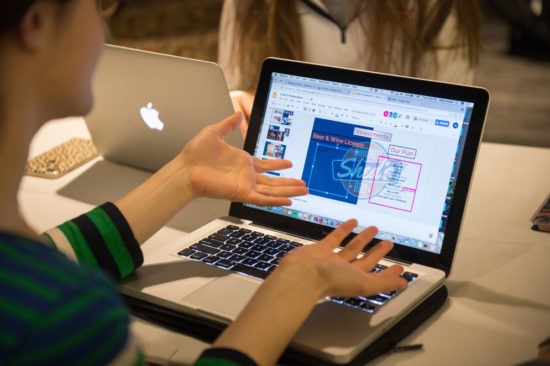
Maier and Thomas (2013) reference Kolb who: “introduced the experiential learning model and articulated the key structural elements and delivery sequences of experiential learning as follows: (a) concrete experience, (b) reflective observation, (c) abstract conceptualization, and (d) active experimentation.” They continue: “hospitality studies surrounding experiential learning have indicated that students who participate in experiential learning activities outside the classroom report higher perceptions of learning outcomes and attain higher levels of aptitude toward industry job placement and expected performance.” (Lee, 2008; Nasr, 2004). Maier and Thomas, relying on Lee’s research, further report that (2008), students who engaged in ELT also demonstrated “an increased understanding of how organizations function, an increased ability to view career expectations realistically, an increased network of professional contacts, increased leadership skills, and increased financial management skills.”
Boston University is taking a big step, leading the way integration of ELT on the college level, by transforming the university’s general education requirements. The new capacity-based model steers students away from specific general education class requirements and instead engages them in developing key skills that will better enable them to “thrive in an interconnected world.”
The BU Hub is Boston University’s university-wide general education program that emphasizes working across disciplines to prepare for a complex and diverse world. The Hub helps students develop six essential capacities—knowledge, skills, and habits of mind—that will equip them to thrive in their personal, professional, and civic lives: Philosophical, Aesthetic, and Historical Interpretation; Scientific and Social Inquiry; Quantitative Reasoning; Diversity, Civic Engagement, and Global Citizenship; Communication; and the Intellectual Toolkit (BU site).
The Hub’s signature elective course is the cross college challenge (XCC) that “is at the crossroads of theory and practice.” This course is centered on a client-based project: “students…use the project as a learning opportunity to address a substantial problem and produce a tangible project over the course of one semester” (BU).
SHA’s curriculum has a strong focus on ELT with most courses leveraging the effectiveness of experiential activities to reinforce learning goals. One of the best examples is SHA’s Advanced marketing course, that has an approach similar to the Hub’s XCC. Advanced marketing course, designed for juniors and seniors who will be in entering the workforce in the next year or two, pairs teams of students with hospitality businesses that have brought forward real challenges for which they seek consultation and advice to solve. Over the course of the semester students serve as consultants to their assigned company to develop deliverable action plans that they present to their clients.
School of Hospitality Administration’s faculty member Leora Lanz works with hospitality companies large and small to articulate marketing challenges. Entrepreneurs, owners and company senior leadership ask students in the Hospitality Strategic Marketing class to suggest new messaging, advertising, outreach, and online approaches for their organizations. Why? “Fresh ideas,” says Lanz , an SHA lecturer. Smart businesses value new perspectives from young, digital-generation minds.
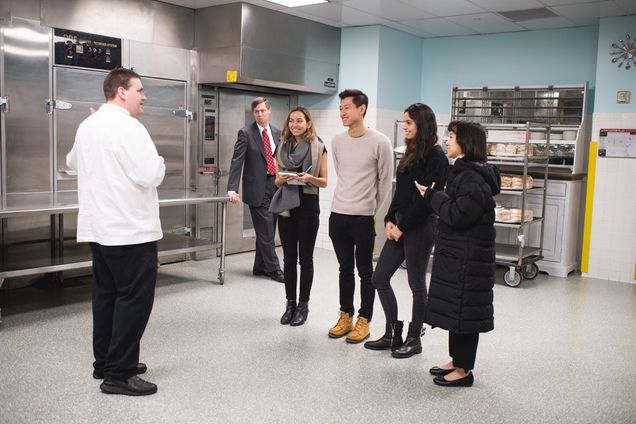
This January, a team of executives from the Massachusetts Convention Center Authority (MCCA), including Caryn Izhar, vice president of convention center marketing, came to Lanz’s class to outline what they wanted to communicate, especially to meeting planners: the restaurant-quality food on offer to convention-goers at the Boston Convention and Exhibition Center (BCEC) amid a hot foodie scene in Boston, and especially in the Seaport District. With hotels offering fewer dining options, says MCCA executive director David Gibbons, the best meal you get might just be at the convention center.
“Starting the project was daunting because our scope seemed so broad,” says team member Julie MacKay. The five-student team started with on-site research, touring the two-million-square-foot venue with Milt Herbert, executive director of the MCCA’s Boston Convention Marketing Center, and following the center’s executive sous chef, Tim Elderkin of Levy Restaurants, on a tour of the small culinary city. Then they were off on their own research and development, looking at competitor sites, analyzing data, and synthesizing recommendations.
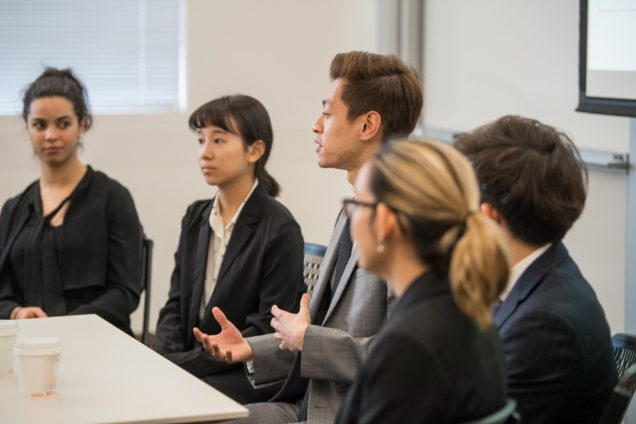
As the students practiced for their presentation in April, Lanz cautioned them to be tactful when they showed a word cloud that featured a few insulting verdicts on the center’s food (“sucks”) from Yelp reviewers. As it turned out, the executives approved of the students’ candor. And they were won over by a presentation that included a two-minute video of Chef Tim talking about the kitchens’ work on sustainability, including composting waste and donating unused food to anti-hunger groups. Filmed just the day before the presentation, it was intended as a template for a series showing authentic stories behind the center’s food. The students also recommended a variety of changes to the center’s website, including a virtual tour, multimedia outreach to meeting planners, and a new tagline: “UnConventional food experiences.”
“Students like this come from very different backgrounds than we come from, and when they do their work and observations, they bring to the table stuff we won’t hear from anybody else,” says Herbert. “They allow us to internalize that and do something with it.”
Team member Sabrina Avila says she found the presentation a bit intimidating. “Knowing that these are people who report to the governor and that they would show up in suits didn’t help the nerves,” she says. But the students felt more confident since they’d worn business attire, and “we would catch the occasional nod of approval from Milt Herbert and he’d jot down a couple of words that resonated with him, and that threw it over the roof for me.”
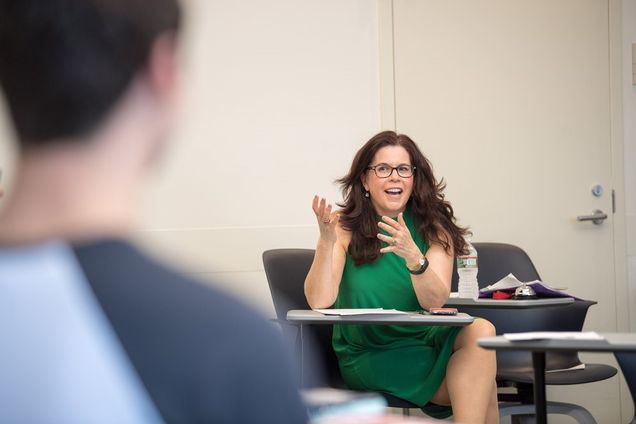
The MCCA was, in fact, a return customer. They had come to Lanz’s class the previous year looking for ways to bolster their relationship with local hotels and restaurants, and the students suggested something basic: Say thanks for their role in the success of the local convention business. So the MCCA did, successfully hosting events for hoteliers and the local food industry.
“I want these kids to think strategically,” Lanz says. “It’s thinking like an entrepreneur, it’s thinking like an owner.”
In addition to her faculty role (she’s been at SHA since 2015), Lanz is principal of LHL Communications, which offers marketing, branding, and media relations to the hospitality industry. She knows the power of class projects—she’d done one for the Greater Boston Convention & Visitors Bureau as a College of Communication student and walked straight into her first marketing job there after graduating.
Lanz says she recruits Boston businesses with marketing needs to put a little trust in her students. Other clients for this year’s class included the Mandarin Oriental Hotel, Mamma Mia’s Restaurant, the Unwind & Dine Personal chef service, and the Boston Hotel Buckminster and its Fenmore Grill restaurant. She thinks that at least one is likely to hire a student from the class.
And while emphasizing a physical presence sounds counterintuitive in the social media era, Lanz says she was most excited this semester by the projects that called for event marketing, pop-ups, and the like.
“This generation of millennial consumer really does photograph just about everything,” she says, “so if something is in front of them and they’re physically interacting with it, that becomes a visual experience and memorable and shareable—that’s the market we live in today.”
This video showcases student projects and presentations in Lanz’s course.
Physical presence was definitely a factor for a client on the smaller end of the scale, Shed’s Barbecue, which has served “real Texas-style” brisket, ribs, and hot links in a 50-seat venue at 32 Bromfield Street, near Downtown Crossing, since 2017. Cofounders, Texas natives, and sister and brother Shawn and Edward Wilson have pride in their grandmother’s recipes. “We are really in need of some good marketing ideas, because the awareness part is what we are struggling with,” Shawn Wilson told the students. In this case, Shed’s students had the advantage of sampling the client’s fare. They also hit the sidewalks off Washington Street to ask the man or woman on the street questions about their restaurant choices, eventually gathering 60 responses.
“It was an awful day outside, cold and kind of rainy,” recalls Maite Erana Salmeron. “I was there for roughly two hours and had a lot of no’s at first, but little by little I figured out how to connect with people and engage in conversation that helped me gather the data I needed.”
In April, the students pitched a marketing plan to the Wilsons that included strategies for making their Instagram feed more interactive. They also recommended a food cart for handing out samples, holding catering events, and a “Cowboys and Concierges” program for costumed delivery of marketing collateral to local hotels that would be hard to forget.
“They’re very creative,” says Edward Wilson. “Since they’re younger and more in tune with the Instagram and Facebook and whatever these young kids are doing, they really know what’s going on. We’re kind of medium on social media.”
“‘Cowboys and Concierges’ was great. And they gave us a plan that’s very easy to execute,” says Shawn Wilson. “I was really impressed.”
The students seem to think they got the better end of the deal.
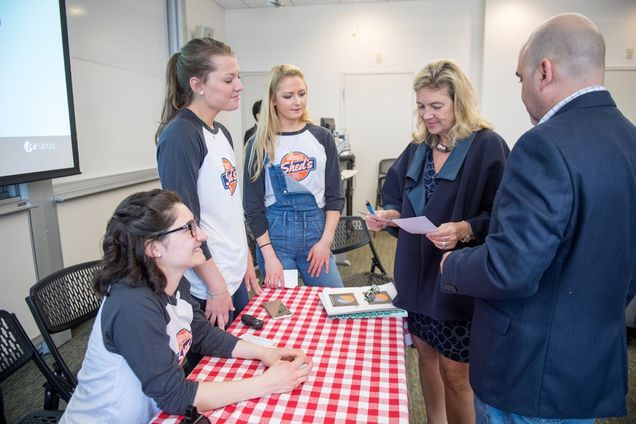
“This project definitely made me more confident about entering the job market,” MacKay says. “It was great to have a meeting-style presentation with real clients and receive that feedback rather than standing in front of a screen and presenting to a professor.”
“Over the summer, I will be working with a company in Madrid,” says Salmeron, “and when I was doing my interview, I discovered that I had a lot more to bring to the table, given this project. I had more terminology and I had an experience to talk about that showed I had truly immersed myself in a business to help it be more successful.”
The advanced marketing course led by Leora Lanz uses ELT by assigning teams of students to serve consultants to hospitality company clients seeking assistance on real challenges. This course takes students through all four elements of Kolb’s model of a concrete experience, reflective observation, abstract conceptualization, and active experimentation relying on client meetings, field trips, primary market research, brainstorming sessions, rehearsals, feedback, final presentations, oral and written reflection exercises, etc. Through their work, students have the opportunity to strengthen a large range of skills (see below) that will better enable them to succeed when they enter the workforce after graduation. Particularly in courses of study such as hospitality administration that prepare students to enter into specific professions, ELT provides a critical bridge enabling students to move seamlessly from theory to practice and therefore enter their chosen fields with the skills and confidence to succeed.
HF460 Experiential Learning Project skills
- Integrating marketing communication
- Applying experiential marketing techniques
- “crowd culture” and the residual impacts of social media
- Creating brand values and proposition, brand identity, and brand communications strategies
- Influencer marketing
- Leveraging the power of market research
- Clarifying of the marketing challenge, identification of the target personas, awareness and tactical strategies to connect with the personas
- Conducting competitive analysis, comparative analysis, SWOTs
- Creativity, structure, and application of marketing communications tools
- Mastering presentation skills to clearly communicate the marketing approach
- Successfully applying digital marketing applications
PDF Version Available Here
This article previously appeared in an earlier version by Joel Brown in BU today on 5/08/2018 titled SHA Students Get the Message Out by Video, Instagram—and Cowboy.
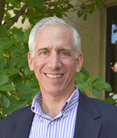 Michael Oshins is Associate Professor of the Practice of Leadership in the School of Hospitality Administration at Boston University. He is former Vice President of Integer Dynamics, a hospitality consulting firm focused on operational productivity and technology. He holds a doctorate in human resource education from Boston University and a master’s degree in hotel administration from Cornell University. Email moshins@bu.edu
Michael Oshins is Associate Professor of the Practice of Leadership in the School of Hospitality Administration at Boston University. He is former Vice President of Integer Dynamics, a hospitality consulting firm focused on operational productivity and technology. He holds a doctorate in human resource education from Boston University and a master’s degree in hotel administration from Cornell University. Email moshins@bu.edu

Joel Brown has been a staff writer at BU Today and Bostonia magazine since 2015. Before coming to BU, he was a Boston Globe correspondent for 10 years, and previously worked for the Boston Herald and the Greenfield Recorder. He graduated from the University of New Hampshire, where he majored in pinball and the student newspaper. He is a Massachusetts native, a lifelong Red Sox fan and a North Shore resident.